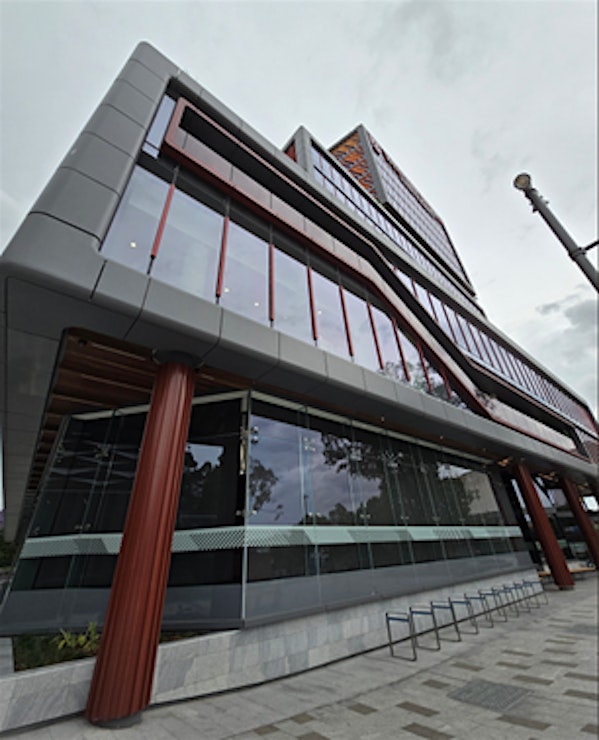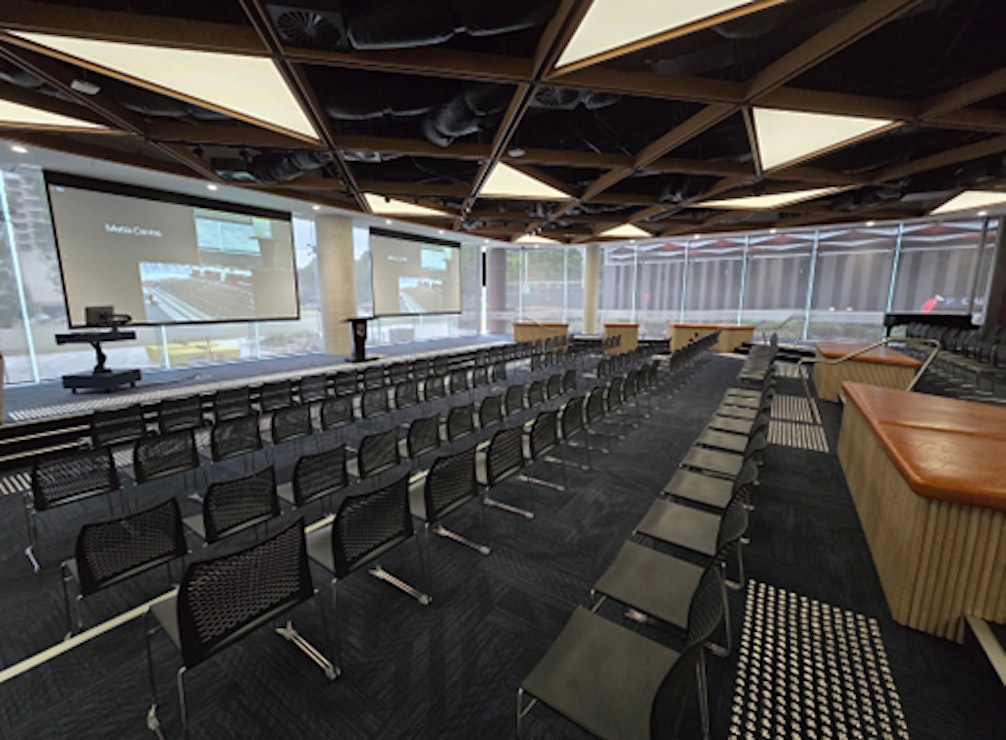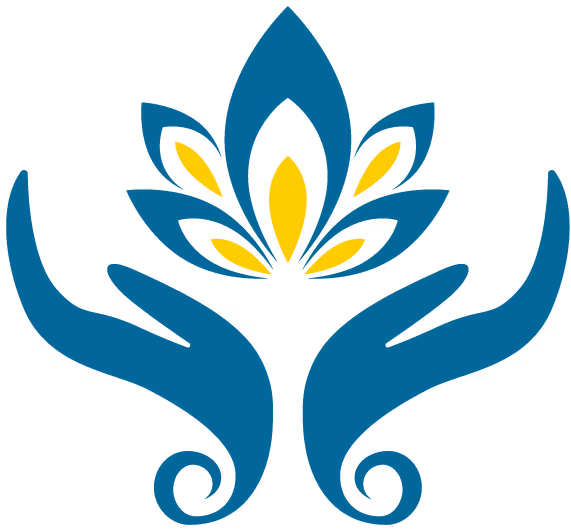
Metta Convention: Many Rivers, One Ocean
Metta Convention: Many Rivers, One Ocean
8-9 November | 9am to 6pm
Location: Western Sydney University, Bankstown
- Parking available at the nearby Civic Centre or please allow for extra time for train-replacement buses
Cost: Free (donations welcome)
This year’s Metta Convention will host local and international speakers from various Buddhist traditions at the auditorium in Western Sydney University, Bankstown. Don’t miss out on meeting and learning from some of the most esteemed Buddhist teachers from around the world at this special event.
What to Bring
- Please bring your own packed lunch and water bottle
- A meditation cushion, if you prefer sitting on the floor
Day 1: Saturday 8 November
9.00 - Registration
9.30 - 10.00 Opening Ceremony from 3 traditions + Buddhist Chant by Davison & President’s Message
10.00 -10.15: Opening Message by Ven. Ngawang Tenzin (Australia 🇦🇺)
10.15 -11.00: Rev. Joan Halifax (online) - Bodhisattvas Serving in the Charnel Grounds: 7 keys to meeting today’s world suffering (USA 🇺🇸)
11.00 - 12.15 Lunch break 🍲
12.15 - 12.30: Ven. Myōgen - Movement Meditation (Taiwan 🇹🇼)
12.30 - 1.00: Ven. Phap Hai - Easing into Deep Calm: a body-based guided meditation (Australia 🇦🇺)
1.00 - 1.30 Ven. Robina Courtin - Tough Love: working with compassion fatigue (USA 🇺🇸)
1.30 - 2.00 Tea Break ☕️
2.00 - 2.30: Ven. Bhante Joe Atulo - For the Sake of the Goal: wilderness monks across traditions and their lessons for us (Sri Lanka 🇱🇰)
2.30 - 3.00: Ven Bhante Sujato - What Stories will You Tell? (Australia 🇦🇺)
3.00 - 4.30: Breakout Sessions (facilitated by various speakers)
4.30 - 5.30: Panel with Ven Sanathavihari, Rev. Ryōtoku, Nadine Levy - The Journey of Healing: understanding what it means to be humans (USA 🇺🇸, UK 🇬🇧, Australia 🇦🇺)
5.30 - 5.45: Closing Message by Ven. Upekkha (Australia 🇦🇺)
Day 2: Sunday 9 November
9.30 - 10.00: Opening Ceremony from 3 traditions + Opening Message & Meditation by Ven. Thubten Chokyi (Australia 🇦🇺)
10.00 - 10.30 : Ven. Ngawang Tenzin - One Vehicle (Ekayana): celebrating complementarity across Buddhist traditions (Australia 🇦🇺)
10.30 - 11.00: Ven. Bhante Suddhaso and Ven. Ayya Soma - Shattering the Mirage of Self: practical guide to embodying Anatta (Italy 🇮🇹)
11.00 - 12.15 Lunch Break 🍲
12.15 - 12.30: Walking Meditation by Ven. Bom Hyon Sunim (Australia 🇦🇺)
12.30 - 1.00: Ven. Matthieu Ricard (recorded talk) - Towards a More Altruistic World (France 🇫🇷)
1.00 - 1.30: Ven Upekkha - Be Kind to Yourself: the world needs it (Australia 🇦🇺)
1.30 - 2.00 Tea break ☕️
2.00 - 2.30: Rev. Ryōtoku - Seeking the Buddha within: evolution of Buddhist concepts from the Pali canon to Mahayana Sutras (UK 🇬🇧)
2.30 - 3.00: Ven. Sanathavihari - Bypassing the Wound: How Spiritual Seeking Can Mask Unhealed Trauma (USA 🇺🇸)
3.00 - 4.30: Breakout Session (facilitated by various speakers)
4.30 - 5.30: Panel with Ven. Myōgen, Ven. Pasanna, and Ven. Tashi Choedup - Trans*ending Suffering, Embracing Truth (Taiwan 🇹🇼, Australia 🇦🇺, India 🇮🇳)
5.30 - 5.45: Closing Message by Ven. Bhante Sujato (Australia 🇦🇺)
Session Outlines where available
Rev Joan Jiko Halifax Roshi
Bodhisattvas Serving in the Charnel Grounds: 7 keys to meeting today’s world suffering
The charnel grounds are where we all practice, from between your ears to between warring nations. This is what Bodhisattvas do. They do not seek easy situations. This talk explores the Bodhisattva attitude and seven keys to meeting the suffering in our world today.
Ven Robina Courtin
Tough Love: working with compassion fatigue
According to the Buddhist model of the mind, virtues such as compassion and love can only cause us happiness, so why do we burn out when we help others? It’s because we have attachment and aversion. Deep in our bones, our attachment craves pleasant experience and everything to be lovely all the time, so when we’re surrounded by a lot of suffering, we have compassion, yes, but our attachment gets upset and aversion arises, and we can’t cope. So we need to learn to be aware of our minds and to be wise in our efforts to help others, and of course, to lessen attachment and aversion and thus increase our compassion and courage to help others.
Ven Matthieu Ricard
Towards a more altruistic world
Our times face many challenges. In particular, we need to reconcile the demands of the economy, the search for happiness, and respect for the environment. These imperatives correspond to three time scales — short, middle, and long term.
Altruism is the only unifying concept that provides us a common to work together for a better world. If we have more consideration for others, we will move towards a “caring economics”, we will be more concerned with inequalities, poverty in the midst of plenty, and we will care more about the fate of future generations and of eight million species who are our co-citizen in this world.
Altruism thus seems to be a determining factor of the quality of our existence, now and to come, and should not be relegated to the realm of noble utopian thinking. We must have the perspicacity to acknowledge this and the audacity to say it.
Ven Sujato
Which stories will you tell?
When they hijack the stories you tell, they hijack your mind. Are you going to live someone else's story? Or will you find your own?
Ven Joe Atulo
For the Sake of the Goal: Wilderness Monks Across Traditions and Their Lessons For Us
There is something striking about the lives of the great forest practitioners. Living in remote wilderness areas, contending with wild animals, illness, and their own inner demons, they point us to a path that leads away from the world and toward a goal worth renouncing everything for.
This talk examines the lives of wilderness practitioners in the Theravāda, Mahāyāna, and Vajrayāna traditions. It explores the common elements of their practices to see what we might learn in order to follow their achievements and reach the end of suffering.
Ven Upekkha
Be kind to yourself: the world needs it
We can be our own harshest critics. The fault-finding mind can turn inward, spoiling even a perfectly good day. But the Dhamma reminds us not to take it all so personally. True kindness begins within. When we care for our tender hearts—not with perfection, but with honesty—we become a source of understanding and compassion for the world.
Rev. Ryōtoku
Seeking the Buddha Within
Throughout the Buddhist discourse there have been many words used to describe the goal of practice. Bodhi , enlightenment, Nirvana, cessation, moksha liberation; from arahantship through to Complete and final Buddhahood.
And at the same time there have been many ways to describe how this state exists within us either in potential form or as fully formed; just veiled and not perceived.
“Seeking the Buddha within” is an approach that emphasises this inner Buddha nature as the ground, the path and the fruit of our practice, allowing us to interpret the dharma as a guide through this inner joirney to find the teacher and the teaching that is always with us. This session’s approach is to take the teachings of the Pali canon from early Buddhism as a base and the Mahayana sutras as an elaboration.
Ven Ngawang Tenzin
Ekayana - One Vehicle: Celebrating Complementarity Across Buddhist Traditions
Drawing on the Lotus Sutra's teaching of "one vehicle" (Ekayāna) and inspired by the Rime philosophy of non-sectarianism in Tibetan Buddhism, this talk explores how Buddhist diversity can be understood in unity rather than division, and as compassionate and skillful means rather than contradiction.
One of my teachers Tomas Dhammadipa is known for his emphasis on Ekayana, quoted as saying, "there is only one Buddhism" - where individual schools are simply "fingers pointing at the moon" - we'll examine how different Buddhist traditions can be seen to complement rather than compete with each other. Like the image from the lotus sutra of a "dharma rain" nourishing many herbs which contain medicines for treating different ailments, each lineage offers perspectives on the cultivation of a "warm heart and flexible mind", aimed at relieving the suffering of beings.
Ven Sanathavihari
Bypassing the Wound: How Spiritual Seeking Can Mask Unhealed Trauma
Do you seek solace in spiritual practices, only to find fleeting peace? Do you come to the temple to escape mental health issues, relationship problems, or lifestyle difficulties?
We'll explore how we often use meditation as a quick fix for deeper issues, rather than confronting the root causes of our suffering. And how, in doing so, we can hide from our own pain – and from others.
Join us for a courageous exploration of the ways we use spirituality to bypass our pain. Discover how radical acceptance, self-compassion, and mindful healing can help you confront and befriend your unhealed wounds, and find true freedom.
Panel: Ven Pasanna, Ven Myōgen, Ven Tashi Choedup
Trans*ending Suffering, Embracing Truth
A compassionate look at identity, non-self and liberation from a LGBTQ+ perspective.
Join monastics from three different traditions as they share their unique perspectives, as queer practitioners, into suffering and the ending of suffering.
Breakout session topics where available
Bhante Akiñcana
Sun: Enjoying the Journey
In this session we’ll look at some ways of bringing the inspiration into your daily practice - through reverence, recollections and contemplation of the beauty of the world we inhabit and the delightful nature of the Dhamma.
Rucha Bhagat
Cultural Practices to social transformation: Buddhism in modern India
Venerable Thubten Chokyi, Chair Australian Sangha Association; Members of Sakyadhita Australia
Sun: How Can We Sleep When Our Beds Are Burning: A Conversation on Climate Change in the context of Buddhist Ethics and Compassion
This session provides a forum for facilitated discussion on the relationship between ethical conduct, the environment and Buddhist practices of compassion and universal responsibility as it relates to the impacts of climate change the earth’s habitats and inhabitants in all our diversity. There is an urgent need for peace and the survival of life on this planet, and the flourishing of the planet itself. What can we do to respond to its call.
Nadine 1
Acceptance vs action: using skilful means to navigate appropriate response to internal and external circumstances
Nadine 2
Imagination and the Buddhist path: exploring how we construct our spiritual journey and what this means for experience
Rev. Ryōtoku 1
“Buppō and Budō” Buddhism and conflict
Rev. Ryōtoku 2
Who am I? Who are you?
Ven Tenzin 1
Sat: Caught in the net: (dis)connection in the age of social media
Ven Tenzin 2
Sun: Tonglen Meditation Workshop: exploring the transformative and powerfully healing practice in the face of suffering
Bhante Joe
Sun: Pushing The Boundaries: Insights From the Buddha's Lay Noble Disciples in Ancient and Modern Times
Ven Myōgen and Davison Tai 1
Master Taixu (1890-1940) towards a comprehensive Buddhism & modern AI challenging our integration of dharma"
In 1931, Master Taixu proposed a vision of cross tradition integration: “Unless we undertake a comprehensive study that synthesizes the traditions transmitted in Ceylon, China, and Tibet, we will be unable to gather the great achievements of Buddhism’s past, and we will have no way to unfold the full transformation of Buddhism in the future.” The following year, he founded the Sino-Tibetan Institute of Buddhist Studies to implement his reformist vision for Buddhism.
In the age of artificial intelligence, cross-disciplinary and cross-sect interpretations of the Dharma will become the trend.
If one clings to sectarian views, unwilling to open one’s mind to discuss Buddhist doctrine and to humbly accept the outcomes of such discussion, one will inevitably be eliminated by the times.
Biographies of Master Atisha record that he delighted in learning the views of all schools and earned the respect of practitioners from each. He did not disparage other traditions to promote his own, yet he could clearly explain them all. This is the model that Buddhist schools should emulate going forward.
Ven Myōgen and Davison Tai 2
"Role of Sangha in an emerging transnational Buddhism"
Ways of relating among the sevenfold community of lay and monastic disciples, drawing on Tibetan Buddhism and the Confucian teacher–student ethos.
Laypeople and monastics alike are disciples of the Buddha; on the basis of practicing the bodhisattva path, the two are equal. Even with respect to personal purity in observing the prātimokṣa precepts, there is no difference between them in the liberation they can accomplish.
In Tibetan Buddhism, teachers and students support one another—for example, the Dalai Lama and the Panchen Lama have served as each other’s teacher and student. Both monastics and laypeople can transmit the Dharma; the key is whether one understands the doctrine, attains realization in calm abiding and insight (śamatha–vipaśyanā), and meets the qualifications of a true teacher.
In the Confucian tradition, teachers and students are both teachers and friends; as Confucius said, “When three walk together, there is always something I can learn from them.” Even today in Qufu, Shandong—Confucius’s hometown—people still address one another as “teacher.”
The emerging cross cultural experience of the Unlimited Lights Chinese Culture Academy in Taipei: lay and monastic students respect one another and selflessly cooperate in both practice and the spread of the Dharma.
Ven Upekkha 1
How can I find some P&Q (Peace and Quiet) in my life?
Ven Sanathavihari:
Sat: Leaning into our tender wounds: how religious words can trigger our unattended wounds.
Ven Phap Hai
Sat: Mindfulness and Resilience
Ven Sujato - 1 of 2 days only
Learn more about the presenters here
Accessibility
This event location has wheelchair accessible drop-off zones, paths, auditorium seating and restrooms (including gender neutral restrooms).
Sound will be amplified and the university utilises LED lights. An infrared audio system is installed in the Auditorium, which attendees can either tune into directly, or they can pick up a receiver from Security near the front desk.
There will not be ASL interpretation or live captions.
Please contact us if you have any questions or specific needs.







